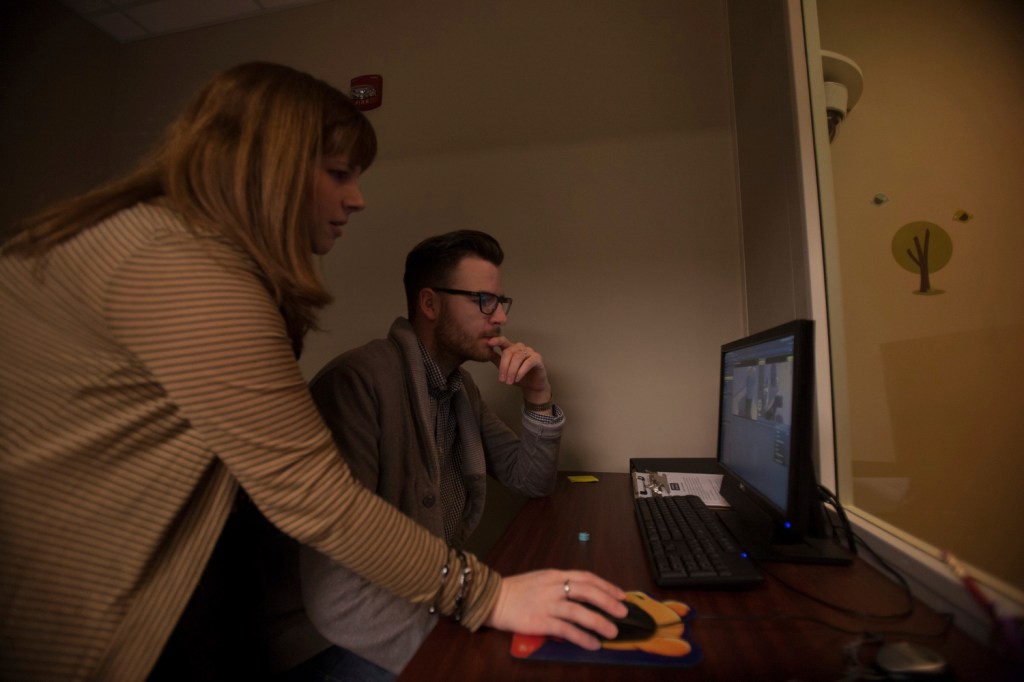WKU infant development study seeks more participants
Published 7:54 am Friday, September 9, 2016

- Diane Lickenbrock, director of the Children and Families Lab, sets up cameras for a family's arrival with undergraduate assistant Nolan Bramschreiber. Photo courtesy of Clinton Lewis, a photographer for Western Kentucky University.
When you look at a typical infant, it’s tempting to think there’s not much going on inside its developing brain.
But for researchers at Western Kentucky University’s Children and Families Lab, that’s an assumption worth putting to the test.
Trending
“We just want to see how babies interact with their parents and how they respond to new things,” said Diane Lickenbrock, a psychology professor who directs that lab.
Researchers at the lab are looking for more participants to contribute to an ongoing study exploring how infants develop socially and emotionally. The study focuses on interactions between parents and their 3 and 1/2 to 4 and 1/2 month-old babies by collecting data from the same subjects over a period of time.
Families will be paid $20 each time they participate up to a maximum of three visits, Lickenbrock said. During the study, parents are asked to answer questions at home, visit the lab to answer more questions and play peek-a-boo and other games with their infant. Researchers will also record the session and collect physiological data.
“We’re very flexible in terms of scheduling,” Lickenbrock said. She added that lab workers can look after parents’ other kids while they’re participating in a research session.
Lickenbrock couldn’t go into detail about what the study’s hypothesis is, but she said its findings could be used to develop methods for intervening in developmental issues during infancy.
Contributing to the study also allows undergraduate and graduate students to sharpen their research skills.
Trending
“We are really focused on giving undergraduates and graduate students basically research skills,” Lickenbrock said. “This gives these students really great skills for the job market or grad school.”
Harrodsburg graduate student Lauren Bailes is pursuing a master’s degree in the university’s psychological sciences program. She’s worked on the project since her sophomore year, around the same time the project started.
“Working in research has really shown me that research is where I want to be,” she said. “It’s very interesting to see how these interactions are able to affect both the infant and the parent.”
Bailes said it’s also giving her an edge when it comes to advancing in her career.
“Being able to interact with adults and children, I’m able to get those skills that are (going to) help me be more marketable,” when applying to doctoral programs and jobs, she said.
Contrary to popular belief, Bailes said there’s a lot more going on when an infant does typical baby things, like chewing on its hands or playing with its feet.
Unlike adults, who can walk away from scary or stressful things in their environment, babies have to cry out for attention or develop coping mechanisms if a caregiver isn’t around. Looking away or chewing on their hands might be a way for babies to distract themselves from a scary bug, for example.
“They really do contribute to their development in ways that a lot of people don’t know,” Bailes said of the infants.
For more information on the study or to participate, send an email to childrenandfamilieslab@gmail.com or call 270-745-4275.
— Follow education reporter Aaron Mudd on Twitter @BGDN_edbeat or visit bgdailynews.com.






